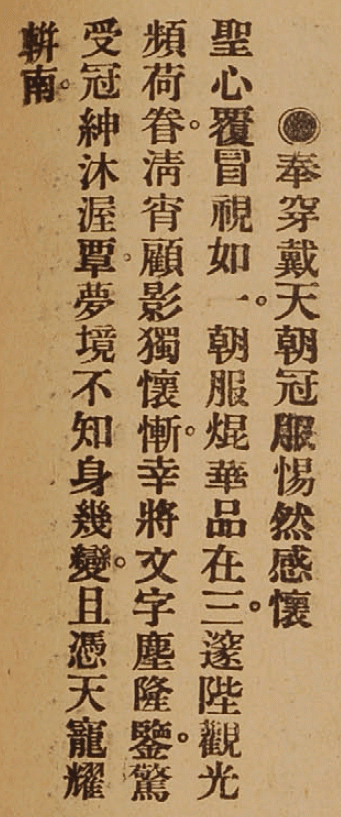Yet another problem with Vietnamese translations of classical Chinese writings is that translators have left out parts of old texts which they do not like.
Take, for instance, the case of Phan Huy Ích’s Tinh sà kỷ hành (星差紀行). This is a collection of poetry which Phan Huy Ích composed during an embassy to the Qing Dynasty capital in 1790-1792.
Phan Huy Ích arrived at the time of Emperor Qianlong’s eightieth birthday celebrations, and was treated well by the emperor. Phan Huy Ích and the other members of the delegation, for instance, were given a tour of one of the palace gardens.
While this impressed Phan Huy Ích, what made him the most excited were two other events that took place. First, Emperor Qianlong read one of his poems. And second, Phan Huy Ích was granted a robe and a cap by Qianlong.
After receiving this robe and cap, Phan Huy Ích composed the following poem entitled “In Awe at Receiving Permission to Wear the Celestial Court’s Cap and Robe” (what I have as “the Sage” and “Him” are all meant to indicate Qianlong):
The Sage’s heart covers the world, treating all as equals,
Court robes of the third rank, so radiant and ornamented.
Viewing the radiance deep in the palace, I often receive His care,
Seeing my shadow on a clear night, I feel ashamed that it is I alone.
I was so fortunate that [He allowed] my writing to dirty His glorious gaze,
And was surprised to receive a cap and sash, bathing in His boundless benevolence.
In this dream realm I do not know how many transformations my body will make,
But for now I know that this Celestial benevolence will send me on my glorious return to the South.
聖心覆冒視如一
朝服焜華品在三
邃殿觀光頻荷眷
清宵顧影獨懷慚
幸將文字塵隆鑒
驚受冠紳沐渥覃
夢境不知身幾變
且憑天寵耀軿南
This poem appears in a (woodblock) printed version of this text (can’t remember the publication date but it should be the late 1700s, still during the Tây Sơn period), as well as in a hand-copied manuscript (A.2435, 37b-38a and A.404, 15a). It also appeared in the classical Chinese section of the journal Nam Phong in December 1926 (# 112, page 78).
Where you will NOT find this poem, however, is in a modern Vietnamese translation of Phan Huy Ích’s poetry which was published in 1978 by the Ủy Ban Khoa Hoc Xã Hội Việt Nam, Ban Hán Nôm, entitled Thơ Văn Phan Huy Ích (Hà Nội: Khoa Học Xã Hội, 1978).
In that book, in the place where this poem should appear, there appears instead the following: “. . .”
So I guess it is good that the translator(s) at least had the professionalism to indicate that they had omitted something.
However, of all the poems to omit (and there are plenty which are “boring” landscape poems), why did they omit this one?
Actually, this was not the only poem omitted from this translation. Several others in which Phan Huy Ích praised “the North” and the Qianlong emperor were also omitted.
The same thing happened to some of the poems which Nguyễn Đề composed on an embassy to the North in which he had high praise for his hosts. They were likewise omitted from the translation of his poetry in Nguyễn Thị Phương chủ biên, Tuyển Tập Thơ Chữ Hán Nguyễn Đề (Hà Nội: Khoa Học Xã Hội, 1995).
We can call this the “Vietnamese nationalist whitewashing of the past.” If there is something in the historical record which makes people today feel embarrassed, just omit it. Who will ever notice?
Phan Huy Ích’s excitement at having received a cap and robe from the Qianlong emperor? It never happened. . .



This Post Has 2 Comments
Hi Khai:
If you read thoroughly the essays and poems of Phan Huy Ích, Đoàn Nguyễn Tuấn, Vũ Huy Tấn on the envoy to Peking in Canh Tuất (1790) plus all the documents from National Correspondences (Đại Việt Quốc Thư) to compare with archives from the Qing dynasty at the same time, you will find out a lot of discrepancies in the “giả vương” conspiracy.
This is a national fake story that I am trying to reveal.
Chinh Duy Nguyen
thank you so much
iphongthuy.net